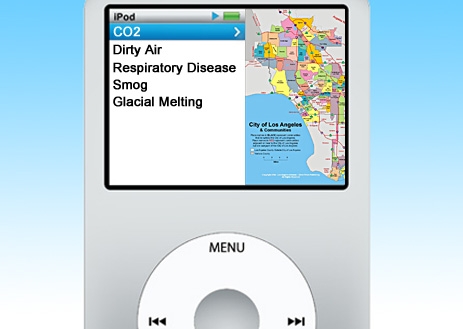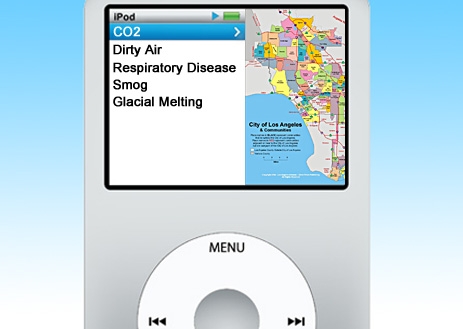 Your 4.9-ounce iPod is responsible for at least 200 times its weight in greenhouse-gas emissions.When you bought your last Apple iPod, you may have been aware that it had been manufactured at a factory in China, perhaps the Foxconn plant in Shenzhen in the province of Guangzhou. (Let’s put aside for the moment the working conditions there.) You may have been aware too that in manufacturing your electronic marvel, the Shenzhen plant emitted roughly 25 pounds of the greenhouse gas carbon dioxide. It’s even possible that you were aware of the 9-10 pounds of CO2 emitted in transporting the device to you from China. (See Apple’s environmental report for the iPod classic [PDF].)
Your 4.9-ounce iPod is responsible for at least 200 times its weight in greenhouse-gas emissions.When you bought your last Apple iPod, you may have been aware that it had been manufactured at a factory in China, perhaps the Foxconn plant in Shenzhen in the province of Guangzhou. (Let’s put aside for the moment the working conditions there.) You may have been aware too that in manufacturing your electronic marvel, the Shenzhen plant emitted roughly 25 pounds of the greenhouse gas carbon dioxide. It’s even possible that you were aware of the 9-10 pounds of CO2 emitted in transporting the device to you from China. (See Apple’s environmental report for the iPod classic [PDF].)
Here’s what you probably didn’t take into account: The coal that powered the Foxconn plant in the south of China likely was mined in the far northern province of Shanxi, transported by truck or rail to coal terminals on the coast (e.g., the port city of Tianjin), and from there shipped by freighter to Shenzhen in the far south. Nor did you likely consider that the air above the Foxconn factory in Shenzhen moves eastward, making its way to Los Angeles in about three weeks’ time. Scientists have calculated that roughly 30 percent of the air pollution in Los Angeles originates in China.
Thus far, then, your iPod has contributed to glacial melting in the Himalayas, the dirty air in Guangzhou, and the increasing incidence of respiratory disease in China. And once the sulfur dioxide, nitrogen oxide, and particulate matter released by the coal that fired the Foxconn plant arrive in L.A., your purchase can claim a small contribution to the heavy smog that hangs over the city of Los Angeles and to the ozone-polluted air Angelinos breathe in daily.
But soon there may be yet a new environmental twist you’ll have to factor into your iPod purchase. As China’s energy needs skyrocket, the country is importing ever more of its coal, even as it mines its own generous reserves. It makes sense, of course, that Vietnam, a nearby neighbor with large coal deposits, would be the big exporter to China that it is. But the state of Wyoming? Yes, Wyoming will soon be supplying some of the energy needed to produce the Chinese-made iPod that will then be shipped thousands of miles to the States for your use.
That’s if Peabody Energy and Australia-based Ambre Energy get their way. Their plan is to mine the low-sulfur coal in the Powder River Basin in southeast Montana and northwest Wyoming, move it by train 1,367 miles (note: Burlington Northern Santa Fe railway estimates that 500 pounds of coal are blown from each rail car for every 500 miles traveled) to a newly built shipping terminal in Longview, Wash., and load it there on to a vessel that will carry it 5,852 nautical miles to ports along the southern and southeastern coasts of China.
Opposition to the plan is growing, according to an excellent article in the latest Sierra magazine. But if Peabody and Ambre do win, next time you buy an iPod, don’t forget to add the CO2 cost of moving coal from Powder River Basin, Wyo., to Guangzhou, China.
One last thing: If you actually use your iPod, every time you give it a full recharge it’s emitting another half-pound of CO2 into the air.
At a minimum, then, your 4.9-ounce jewel of an iPod, over the course of its life, is responsible for 200 times its weight in greenhouse gas emissions. And there still remains the matter of recycling …
I wish I didn’t love my iPod.
—–
Also check out: Like your dinner, your gadgets come from somewhere


